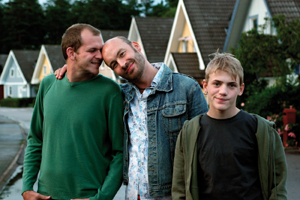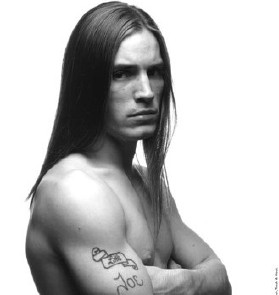
(103
min)
AB Sevenska Filmindustrie
Directed by Ella Lemhagen
Review by Carl Macki
 Göran (Gustaf Skarsgård)), Sven (Torkel Petersson),
and
Patrik (Thomas
Ljungman)
Göran (Gustaf Skarsgård)), Sven (Torkel Petersson),
and
Patrik (Thomas
Ljungman)
Shown
at the Toronto FIlm Festival, Frameline, London Lesbian and Gay Film
Festival,
and the Inside Out Film andVideo Festival.
Also Won Rosebud
Awarded as Best Feature Film at Verzaubert,
the
Internation Gay and Lesbian FIlm Festival
This
is a funny movie. It is corny in spots, but never badly slips as it
walks down the stairs.
The
quality of production is stellar -- it's Ingmar Bergman's old film
company after all -- and the three main characters are like we are
watching a real family.
Some
may complain that this is a trite
complicated situration covered by many other indie films. I don't know.
It worked for me. I enjoyed the way the film unfolded.
Göran is a doctor and is married
to Sven, who works in an office. (Sven is kinda reminiscent of a gay
Swedish version of Larry the Cable Guy.)
While Göran passionately
wants a
son, Sven is not enthusiastic, and not quite certain what
they
are getting into, but both agree to adopt a baby.
Swedish Social
Sevices
have put them on track to be adoptive parents. They get a letter from
the agency offering them "Patrik, Age 1.5," an orphan.
They
agree and you already see a video camera in the
new nursery of their
comfortable middle class row home in an unspecified suburb.
On
the day of arrival, a tousle-haired fifteen-year old shows up. In
several scenes, his haicut looks like a Mohawk that has grown out.
He tells the couple that his
name is Patrik and that he has been sent by Social Services to live
with them. They don't know what to make of this!
When Göran and Sven go to the Social Services office to
complain, the clerk tells them they do not right to
know
details of Patrik's past.
Sven storms th e cubicle
where the
clerk is working and pulls the the information file from the computer
and
prints it up and the two flee the office.
It turns out that Patrik has been in trouble with the law in his short
years. That doesn't stop him from hateful judgements of his new
parents.
Göran and Sven have
to bide their time it being the weekend.
Where Göran tries to befriend Patrik, Sven gets more estranged from the
two. When Göran finds out that Patrik is a
talented gardener,
something he learned in the foster home, and has been helping
the
neighbors, Göran hires him to help out in their own yard.
Göran and Sven eventually find out that a clerical error led to the
misreporting of Patrik's age. Instead of age 15, the age was reported
as 1.5. This may have been a con
-- it's unstated--Göran thinks it's okay
for Patrik to stay until Social
Services find
another family to adopt the adolescent, but Sven decides
that he cannot live with Patrik any more, and
leaves Göran.
When Sven wants to come back a few days later, Göran will not take him
back. Göran and Patrik continue to bond, and
when Patrik is finally offered a new family,
Göran is not sure that he
wants to let him go.
Eventually all three end up
in one happy family.
There
are some great scenes. Like one where Göran is having a conversation
with a drunken neighbor who alludes to an imaginary sexual relationship
between
Göran and the boy, so Göran flips the lout over his
shoulder and
onto a bunch of big pebbles by the neighbor's driveway. This
judo
move is out of character
but it one that Patrik earlier taught him.
It
is fascinating to see how another country handles gay marriage, and
also how muck Sweden is still like the United States. Although Sweden
is very progressive
on the issue, it appears that they have a few dark clouds in their sky.
For Social Services, gay marriage is not as fully 'legit' as a
hetero one,
otherwise why is a 'troubled-making' teen like Patrik 'dumped' onto two
male parents?
I
realize the issues may be complex and this is a comedy -- not
to be taken too seriously. It is an entertaining look at
a social issue
that is affecting the world's cultures and strongly shows up on the
right side of the situation.
|
"Little Joe," the exciting new film on
Joe
Dallesandro by Nicole Hausser, was shown at the Castro
late last month. See the review of it by Sharla Cartner in this issue. Be on the lookout for it at preferred
art house cinemas and festivals or as a DVD.
|
 |




